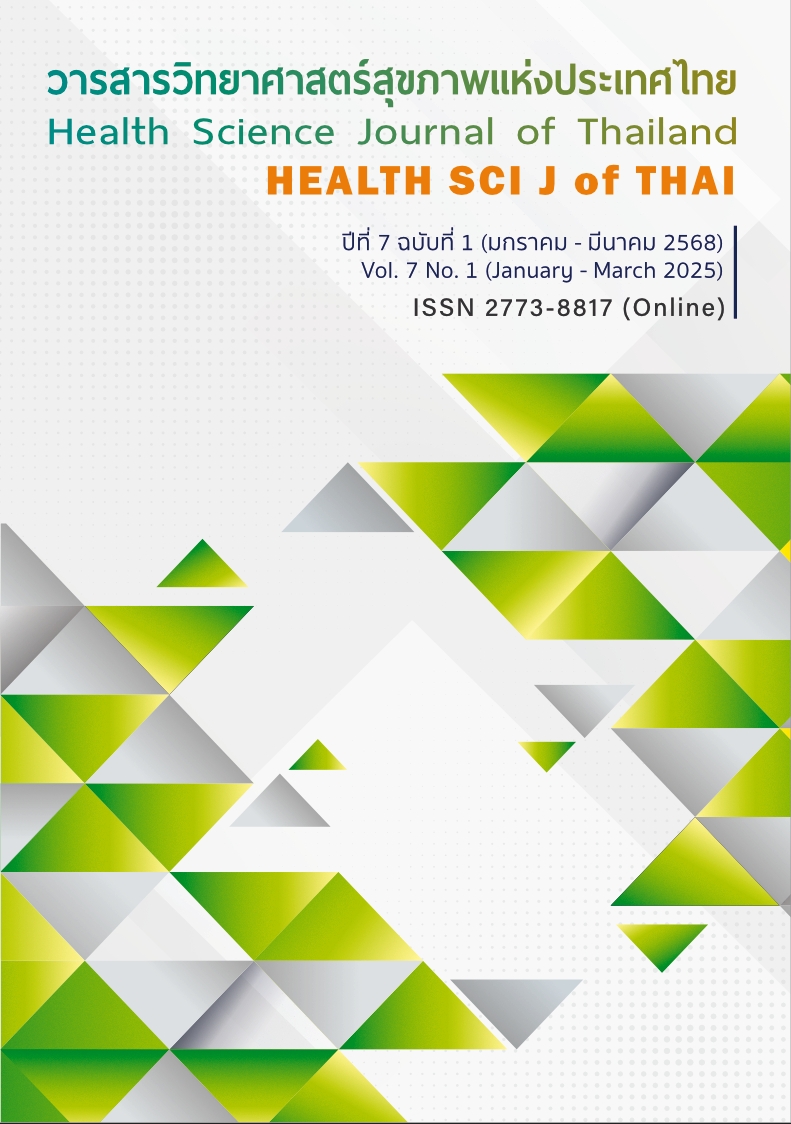Effects of Rational Drug Use in Community Promotion Model on Drug Use Safety among People in Trang Province
Main Article Content
Abstract
This quasi-experimental study aimed to study the effects of rational drug use in a community promotion model on the safety of people's drug use in Trang Province. The research sample consisted of 60 representatives from households in Trang Province, selected through a multistage stratified randomization process. The research samples were divided into two groups: 30 samples in the experimental group and the other 30 samples were in the controlled group. The experimental instrument utilized the rational drug use in community promotion model for a period of 6 weeks, encompassing 6 activities: 1) problem identification, 2) knowledge clarification, 3) active learning, 4) access to necessary information, 5) smart drug use, and 6) observation. A questionnaire served as the instrument for data collection. Data were analyzed using descriptive statistics, paired t-test, and independent t-test. The research findings revealed that after applying the model, the samples in the experimental group demonstrated higher mean scores of rational drug use literacy. This included understanding the meaning of words, knowing about advertising media, choosing to buy and use drugs, using drugs according to their labels and packets, and exhibiting overall and appropriate drug use behavior. These scores were higher than those of the control group before the experiment, and were statistically significant at the 0.05 level.
Article Details

This work is licensed under a Creative Commons Attribution-NonCommercial-NoDerivatives 4.0 International License.
References
Singhiranuson C. RDU Community. The development of rational drug use in the community; 2019 Dec 24-25; Amari Don Mueang Airport Hotel. Nonthaburi: FDA; 2019. (In Thai)
World Health Organization. The rational use of drugs. Conference of Experts on the Rational Use of Drugs. 1985 Nov 25-29; Nairobi. Geneva: WHO; 1985.
Food and Drug Administration. Rational drug use situation, problem conditions and related factors. Nonthaburi: Medicines Regulation Division; 2016. (In Thai)
Food and Drug Administration. National Drug Information: Strategy 2 Rational Drug Use. Nonthaburi: Food and Drug Administration; 2011. (In Thai)
Alhomoud F, Aljamea Z, Almahasnah R, Alkhalifah K, Basalelah L, Alhomoud FK. Self-medication and self-prescription with antibiotics in the Middle East-do they really happen A systematic review of the prevalence, possible reasons, and outcomes. Int J Infect Dis. 2017; 52: 3-12.
Ndung IK. Investigation of over the Counter Diagnosis and Drug Dispensation in Chemists: A Case Study in Thika Sub-County, Kenya. American Journal of Theoretical and Applied Statistics. 2015; 4(6): 464-470.
Akıcı A, Mollahaliloulu S, Donertas B, Ozgulcu S, Alkan A, Filiz BN. Patients' attitudes and knowledge about drug use: a survey in Turkish family healthcare centers and state hospitals. Turk J Med Sci. 2017; 47(5): 1472-1481.
Phonlavong C, Kitikannakorn N. General population's knowledge, beliefs, and care-seeking behavior about antibiotics: a cross-sectional survey in Lao People's Democratic Republic. Thai J Pharm Prac. 2018; 10(2): 411-420. (In Thai)
Carla F, Rodrigues. Self-medication with antibiotics in Maputo, Mozambique: practices, rationales and relationships. Palgrave Communications. 2020; 6(6): 1-12.
Chhorvoin O, Frances D, Erika RV, James CM, Mary LM. Pervasive antibiotic misuse in the Cambodian community: antibiotic-seeking behaviour with unrestricted access. Antimicrobial Resistance and Infection Control. 2017; 6: 30.
Dokbua J. Smart School Rational Drug Use: Case study, Pathum Ratchawongsa District, Amnat Charoen Province. Amnat Charoen: Pathum Ratchawongsa Hospittal; 2019. (In Thai)
Food and Drug Administration. Summary of reports of adverse drug reactions for the year 2019. Bangkok: Aksorn graphic and Design Publisher; 2020. (In Thai)
Bandura, A. Social foundations thought and action: A social cognitive theory. New Jersey: Prentice-Hall; 1986.
Thimayom P, Chuawanlee W, Jinnge P. The Effect of Self-efficacy Program on Self-care Behavior of Hemiparesis Patients. Journal of Behavioral Science for Development. 2012; 4(1): 63-73. (In Thai)
Trang Provincial Public Health Officer. Report on the results of hospital work promoting the rational use of medicine, Trang Province, fiscal year 2021. Trang: Trang Provincial Public Health Officer; 2021. (In Thai)
Ministry of Interior. Population and house statistics for the year 2022. Bangkok: The Bureau of Registration Administration; 2022. (In Thai)
Glass GV. Primary, secondary and meta-analysis of research. Educational Researcher. 1976; 5: 3-8.
Wungsri P, Leehalagul V, Torsakulkeaw T. The effects of supporting self-efficacy program in nephropathy control for diabetic type 2 Patients. Journal of Nakhonratchasima College. 2016; 10(2): 98-110. (In Thai)
Yan Ta Khao District Public Health Officer. Area of responsibility of the Subdistrict Health Promoting Hospital in Yan Ta Khao District. Trang; Yan Ta Khao District Public Health Officer; 2022. (In Thai)
Nunkong K. Development of a model on promoting rational drug use community for the safety of people in Eastern Economic Corridor. Dissertation for the doctor degree of public health faculty of public health: Burapha University; 2021. (In Thai)
Bandura A. Social Learning Theory. New Jersey: Prentice–Hall; 1977.
Cohen JM, Uphoff NT. Development participation: Concept and measure for project design implementation and evaluation. New Youk: Cornell University; 1977.
Bloom BS. Human Characteristics and School Learning. New York: McCraw-Hill Book Company; 1968.
Best JW. Research in Education (3 rd edition). New Jersy: Pretice; 1977.
Aiumsupasit S. Theories and techniques inbehavior modification (7rd edition). Bangkok: Chulalongkorn University press; 2010. (In Thai)
Moonla K. Effects of health education program of oral health care behavioral development for Gingivitis Prevention among the Students Grade 5, Siboonruang District, Nong Bua Lam Phu Province. Thai Dental Nurse Journal. 2012; 23(1): 40-50. (In Thai)
Thanomsat k, Tapasee W. The study of drug compliance behaviors model of elders with hypertension in community. Area Based Development Research Journal. 2015; 7(2): 36-49. (In Thai)


